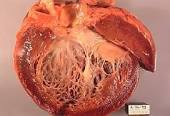Leave a Comment:
1 comment
[…] CardioProtective Therapies… […]
Reply
Learn about conventional, complementary, and integrative therapies.
Dealing with treatment side effects? Learn about evidence-based therapies to alleviate your symptoms.
Click the orange button to the right to learn more.

“Anthracycline cardiotoxicity is commonly progressive and irreversible.” That quote from the second study linked below just about says it all. At least for me it says it all. I underwent anthracycline chemotherapy (doxorubicin), the A in VAD and then followed up a month later with high-dose cytoxan and then an autologous stem cell transplant featuring cardiotoxic chemotherapies including busulfan and melphalan for good measure.
I developed chronic a-fib in the fall of 2010 about fifteen years later. I tossed off the chronic a-fib as just another side effect of my high-dose chemotherapies from my conventional treatment ’95. An echocardiogram in ’16 and ’18 has got me wondering what exactly is wrong with my heart now and in the days ahead…
Once Dr. Moudgil told me that I suffered from chemotherapy-induced cardiomyopathy, it took only a few weeks of online research for me to figure out that I had a serious health issue on my hands.
I don’t mean to sound dark but there is not much that I can do. I can try to figure out what to eat, supplement, how to exercise, things like that, but there is not much more I can do to heal my heart.
This post is about what you can do if you are about to undergo cardiotoxic chemo or have recently undergone cardiotoxic chemo or a caring for someone who has undergone cardiotoxic chemotherapy. I do encourage you to talk with your oncologist/cardiologist about any/all therapies that you can undergo that may help you manage your cardiotoxicity. Keep in mind, however, that every single study I’ve read doing research into my problem has the author lamenting that the “pathogenesis is not well-understood” or some nonsense like that. Translation…oncologists are prescribing a drug that is damaging, often permenantly, to your heart. The end justified the means.
As you can read, the therapies above have been tested mainly on animals. While I consider this “evidence-based medicine” my oncologists Nathan Berger M.D. and Hillard Lazarus M.D. would not. Many of the therapies listed above where known in 1995 when I underwent V.A.D., Cytoxan, Busulfan and Melphalan therapies but my well-educated, experienced oncologists never mentioned the possibility of supplementing with therapies that were not approved by the F.D.A so here I am.
Are you considering undergoing cardio-toxic chemotherapy? Have you already done so and are wondering about your heart’s future? Scroll down the page, post a question or comment and I will reply to you ASAP.
thank you,
David Emerson
Anthracyclines, especially doxorubicin and daunorubicin, are the drugs of first choice in the treatment of patients with hematologic malignancies, soft-tissue sarcomas, and solid tumors. Unfortunately, the use of anthracyclines is limited by their dose-dependent and cumulative cardiotoxicity.
The molecular mechanism responsible for anthracycline-induced cardiotoxicity remains poorly understood, although experimental and clinical studies have shown that oxidative stress plays the main role.
Hence, antioxidant agents, especially dexrazoxane, and also other drug classes (statins, β-blockers) proved to have a beneficial effect in protecting against anthracycline-induced cardiotoxicity. According to previous clinical trials, the major high-risk factors for anthracycline-induced cardiotoxicity are
and other diseases such as Down syndrome, familial dilated cardiomyopathy, diabetes and hypertension. Consequently, further studies are needed to elucidate the molecular pathogenesis of anthracycline-induced cardiotoxicity and also to discover new cardioprotective agents against anthracycline-induced cardiotoxicity.”
Anthracyclines, including doxorubicin, epirubicin, daunorubicin and aclarubicin, are widely used as chemotherapeutic agents in the treatment of hematologic and solid tumor, including acute leukemia, lymphoma, breast cancer, gastric cancer, soft tissue sarcomas and ovarian cancer.
In the cancer treatment, anthracyclines also can be combined with other chemotherapies and molecular-targeted drugs. The combination of anthracyclines with other therapies is usually the first-line treatment. Anthracyclines are effective and potent agents with a broad antitumor spectrum, but may cause adverse reactions, including hair loss, myelotoxicity, as well as cardiotoxicity. We used hematopoietic stimulating factors to control the myelotoxicity, such as G-CSF, EPO and TPO.
However, the cardiotoxicity is the most serious side effect of anthracyclines. Clinical research and practical observations indicated that the cardiotoxicity of anthracyclines is commonly progressive and irreversible. Especially to those patients who have the first time use of anthracyclines, the damage is common. Therefore, early detection and prevention of anthracyclines induced cardiotoxicity are particularly important and has already aroused more attention in clinic. By literature review, we reviewed the research progress of cardioprotective agents for prevention of anthracycline cardiotoxicity.
[…] CardioProtective Therapies… […]
Reply